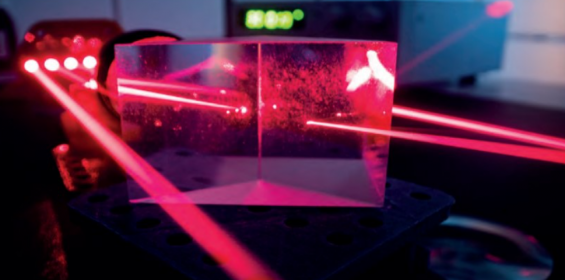3D laser beams innovation set to transform UK manufacturing
Published: 16 August, 2021
The National Robotarium is to develop madeto-measure 3D laser beams which has the potential to transform the capabilities of UK manufacturing.
Researchers at the National Robotarium, hosted by Heriot-Watt University in Edinburgh, have secured £586,000 to develop 3D laser beams whose shape can be changed. The innovation is set to transform the manufacturing and healthcare technology industries, making it easier and cheaper to produce products that require highly-precise manufacturing, such as medical equipment and mobile devices.
The funding from the Engineering and Physical Sciences Research Council (EPSRC), part of UK Research and Innovation, will support the research and development of the lasers for industry application, accelerating the commercialisation of the technology for the benefit of businesses and the wider UK economy.
Lasers are a crucial component of modern manufacturing, with the global laser processing market projected to grow from $4 billion (£2.8 billion) in 2020 to $5.8 billion (£4.1 billion) by 2025. They are used widely by industry to produce precise incisions and mould materials into specific shapes.
However, this approach to laser-based manufacturing depends on melting or vaporising the material, which means the laser’s energy must be focussed on the right points. The standard laser beam shape makes it difficult to tailor this for specific manufacturing processes, decreasing efficiency and limiting what can be made.
The research to be undertaken at the National Robotarium will develop laser beams which have been specifically designed to meet the exact manufacturing requirements of products, improving efficiency and precision. The National Robotarium is supported by £21 million from the UK Government and £1.4 million from the Scottish Government as part of the £1.3 billion Edinburgh and Southeast Scotland City Region Deal - a 15 year investment programme jointly funded by both governments and regional partners.
UK Government Minister for Scotland Iain Stewart said: “This is cutting-edge technology in every sense of the phrase. These 3D lasers are set to unlock previously unheard of levels of precision and so transform our manufacturing and medical technology industries, boosting the UK’s global reputation for innovation and attracting jobs and further investment. “This exciting research is being supported both by a £586,000 UK Research and Innovation grant, and our £21 million investment in the National Robotarium through the Edinburgh City Region Deal.”
The Scottish Government’s Cabinet Secretary for Finance and the Economy Kate Forbes said: “I’m very pleased to hear this cutting-edge research will be carried out at the National Robotarium, which is funded through the Edinburgh and South East Scotland City Region Deal, and that it will have a direct impact on our world leading manufacturing industries.
“This is a crucial time for business, trade and investment in Scotland. City Region and Growth Deals have a key role to play in our economic recovery from the pandemic as we work towards a fairer and more inclusive Scotland. Our £300 million commitment to the Edinburgh and South East Scotland City Region Deal will enable much needed investment in transport, housing, culture, and innovation, as well as skills development for local people, to help build a future economy that benefits everyone.”
The new technique could be harnessed to improve how holes for sensors and cameras on smartphone screens are drilled and to increase the density of information on semiconductor chips, helping to keep up with the everincreasing demand for more memory in devices.
Medical applications could include cancer surgery, where it is hoped more precise medical instruments could allow the resection of tumours without removing healthy surrounding tissue. In an academic partnership, the project’s research into this kind of medical application will be supported by Professor David Jayne at the University of Leeds.
Other examples include fabricating waveguide devices to support telecommunications and the internet, microscopy and even astronomic telescopes. The National Robotarium is a world-leading research facility for robotics and artificial intelligence that will create innovative solutions to global challenges using cutting-edge research, product design and industry collaboration.
In keeping with the National Robotarium’s focus on industry collaboration to solve global challenges, researchers will be working with three industrial partners throughout the project to optimise the approach and final product for commercial application. Industrial partners PowerPhotonic, Oxford Lasers and the G&H Group will also support testing in real-life industrial settings.
Dr Richard Carter, Assistant Professor of Applied Optics and Photonics at Heriot-Watt University and the project’s lead, said: “Manufacturing is of key strategic importance to the UK, with a particular focus on high-tech and high-value manufacturing. This research will address the priority area of digital manufacturing, enabling a bespoke, rapid response capability for the first time. The new methods we are developing represent a paradigm shift in the capabilities of laser-based manufacturing, making it possible to move between 3D beam shapes with zero downtime, low cost and minimal technical know-how.
“Through collaboration with our industry partners, we’ll be able to develop the lasers in line with what industry needs, providing solutions to manufacturing challenges across a wide range of sectors. However, this technology could also support research in quantum technology, waveguide physics and the bio-sciences - anywhere where light must be controlled and manipulated.”
Bringing together academics and global companies, the National Robotarium will provide a catalyst for entrepreneurship and is expected to deliver sustainable economic benefit to Edinburgh, the UK and beyond. The new building under construction at Heriot-Watt University’s Edinburgh campus is expected to open in Spring 2022.
https://twitter.com/HeriotWattUni
https://www.linkedin.com/school/heriot-watt-university/







